
In Four Short Weeks ««« 2017 »»» Last Sushi
01.01.17
-Bill Watterson
It's not denial. I'm just selective about the reality I accept.
The Art of Losing
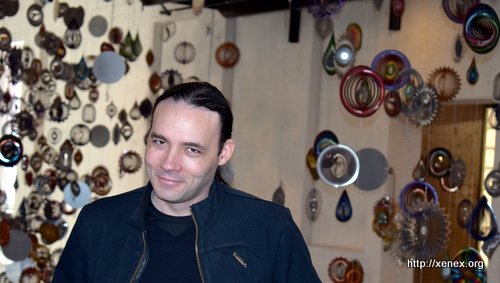
Daniel comes to our door a little before nine in the morning that we could get to Mass MoCA when it opens. Despite stopping for sandwiches, we arrive at the museum fifteen minutes before it opens.
Amber and I dozed in the back seat. Where usually there would be Cannibal Corpse, Die Antwoord, or an episode of Harmontown coming from the speakers, today there was only silence. Before nodding off, I asked Kest what sort of music she likes - she will be taking Daniel away in less than a month and I still know so little about her. She answered that she likes circus music and this seemed obvious.
Before Daniel picked us up, I told Amber that I've felt this urge to discover and describe their flaws. She astutely fingered this as the anger stage of grief.
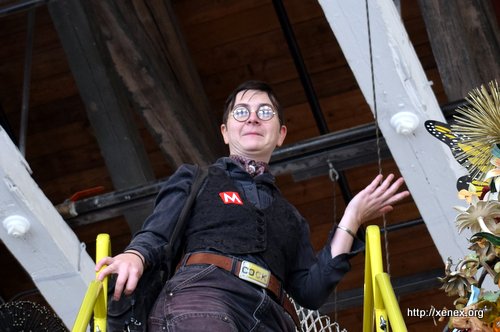
Until the museum opens, we go to a nearby café to properly caffeinate Daniel. He buys Amber a slice of coffeecake, which I munch on when she goes to the bathroom.
Kest sits across from me, a dapper brimmed hat on her head, a silk scarf around her neck pinned with a button whose text I do not get close enough to read, her perfectly round spectacles. I don't actually dislike her in the least, I just resent that she represents the catalyst finally bringing Daniel to new climes.
It is tedious to read a detailing of someone else's trip to a museum, so I will be brief. Kest all but runs to an exhibit, which I take as pretty but meaningless mobiles by the thousands, strung from the ceiling to floor next to a cloud of chandelier crystal. It is only once I notice that guns predominate the mobiles and racial stereotype jockeys hide above the cloud that Daniel explains the whole piece is a commentary on police violence against African American youth. I wonder if this meaning is why Kest was so urgent in getting here or if she merely appreciates the spectacle.
Learning how to use my digital SLR camera on the exhibits gives a secondary focus to this trip. My primary focus remains staying in this moment with Daniel with an acknowledgement that they will soon be vanishingly rare. Kest uses my point-and-shoot to record architecture and pieces reflected in other pieces. I want to chronicle my friends and this day - I do not necessarily care about clever shots.
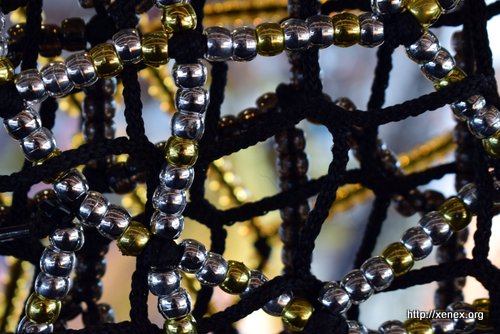
Kest uses as much of the day at the museum as she can. She spends what feels like the better part of an hour in the first room and moves only slightly faster as she progresses, taking in the art. Daniel follows her in taciturn devotion. She grants us permission to explore the museum at our own pace, but the art is not my explicit purpose in being here. Any time I have time for the drive and the price of admission, I can visit Mass MoCA, but it will not be this day with them.
I am the one who eventually introduces the topic of having lunch. Kest is too giddy with the art, Daniel is too quiet, and Amber is perfectly willing to let me play the role of philistine, valuing bodily satisfaction over aesthetic appreciation. Over lunch, because I find the topic interesting for its social eccentricity, I end up talking about the origin and cultural impact of RealDolls. Later, Kest apologies for being geeky about dinosaurs, but I find most things can be forgiven by one who holds forth about sex dolls in earshot of children.
Later, we end up in a dim room with several boxes featuring punched out dots approximating angular galaxies. I instantly collapse on a provided beanbag chair and, soon, Amber collapses on my chest. There is another beanbag on the opposite side of the room, but Daniel and Kest forsake this for sitting on their heels ten feet away. Until other patrons come in, it is as though the rushing of time has stopped. We have nowhere else to be, no other exhibit Kest needs to see before the museum closes. But we are not together. We are in our separate boxes of stars, impenetrable and drifting in the darkness.
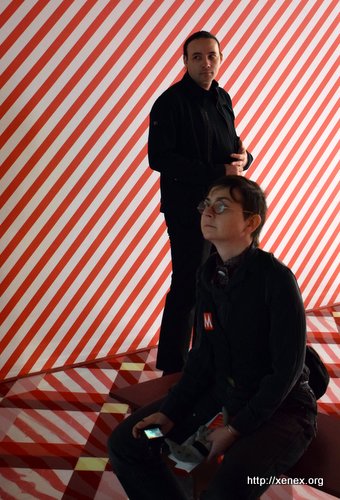
When Kest is finally satisfied that she has seen all she needed and the museum is closing in fifteen minutes, Daniel and Amber go off in search of coffee for him. I connect with Kest in the coatroom, explaining the location of our respective partners. We go outside to meet up with them, but Kest halts me. There is an outdoor exhibit she wanted to see since she has the time. I say that I'm game and ask the location or name. When she calls it something like "gold in the cracks," I direct her to the pavement beneath her feet, where an artist has filled in the fissures with gold epoxy.
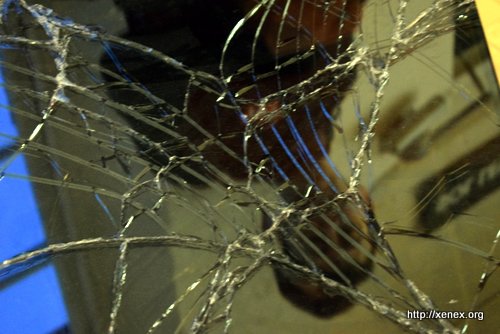
Amber and I doze again on the drive home, in the quiet and the dark. It is New Year's Eve and this trip was only meant to be the first course. I had intermittently been messaging Kristina, with whom we intended to connect for the festivities. I had told her about Daniel's impending exodus partly to share my grief, partly for spite, partly because I doubt he intended to do so himself, and partly because I knew it assured she would show up to one of the last occasions Daniel would attend as a resident of the Hudson Valley. He wanted to go to the restaurant Pakt, which he tenders dearer than his former beloved Duo. From all I could see, nothing more than a usual dinner was happening for New Year's Eve, but it is what Daniel said he would be doing, so it is what would be done. Next year, he will not be a factor. I say to Kristina that I do not want to ring in the New Year at Pakt, but that I expect Daniel to excuse himself by ten. Amber and I arrive first. Kest made clear that they would arrive sometime after eight, but I grumble that I am not too optimistic. We've spent ten hours together. I can spring back with a plan and three hours dozing in a car. Daniel - and I assume Kest - need more recharging.
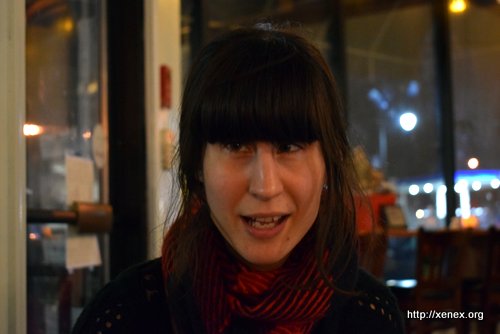
When we arrive, there is a table with a place card reading "Daniel," but I know it cannot be our Daniel. There are too many seats and it speaks to a level of preparedness and certainty that does not indicate him. Indeed, woman with bright hair and their male companions soon assume it.
While waiting, and intercut with my practicing my photographic skills on her, I tell Kristina how the day went and bring her up to speed on Daniel. I don't know much more, detailing instead my grieving process. "I've messaged a couple of people online, just to remind myself there are other people. When one guy I didn't message contacted me, I freaked out a little because I didn't feel at all ready." This is bargaining. It is not acceptance.
Daniel and Kest show up fashionably late, just after we gave up and ordered. The waiter seems to apologize to Daniel for letting us order, not realizing for whom we waited. As with Duo, as with the coffee shop, as with all other places Daniel frequented in search of food or drink, he made an impression on those who saw him daily. He will of course not tell them he is going - he was reluctant to tell me when he did - and they may not notice his absence for months, when someone hazily asks after the dashing eccentric who occupies the corner table for hours at a time. The other person will squint their eyes against the sands of time, trying to recall the last time they refilled Daniel's coffee. He will maybe be a story, definitely a memory.
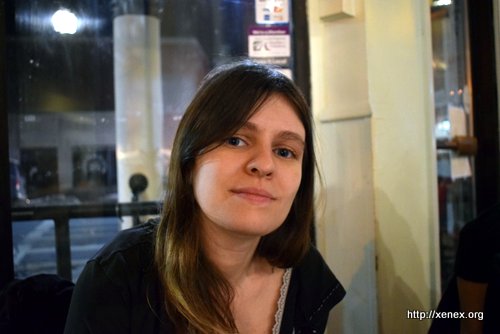
It seems the waiter brings Daniel a French press full of tea without him ordering it.
I fear all this sounds dour and dark, but it felt mostly normal. Kristina opened up Amber's gift to her - a pineapple t-shirt - and has Daniel open the gift she got for him - a pineapple censer. Amber later reports that Kest seemed bemused by the curiosity of this, the evident inside joke not explained between us.
After devouring a shank of lamb, Daniel announces that Kest and he will be going. I look at my watch, then thrust it at Kristina. "9:58! I said you would leave by ten," I explain.
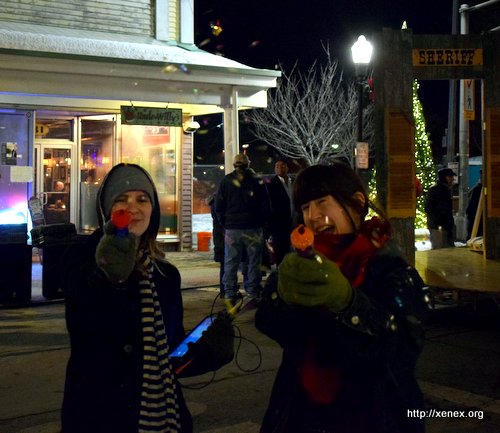
I am uncertain what to make of Daniel's expression then, but I choose to believe he was amused.
We remaining three go to Uptown Kingston, there to huddle against the cold. Kristina leaves a touch after eleven to see a boy who may be her boyfriend again, or he may not be. She says she may come back before the ball drop or call Amber if she can meet us for our traditional midnight brunch, but I know she won't for the same reason I knew Daniel would leave at ten. I know them. I know their drives and needs. It is how I love them, by understanding them in increasing millimeters so that I can predict their actions. It is how I keep from being disappointed, if not hurt. Owing to these factors, adding in these influences, understanding this history, my loved one will move like a clockwork angel. So, even when they leave, it is not unexpected, only gears turning. Only a predictable reaction to a new line of code. I can't be angry or depressed. I can't deny who they are, can't bargain away that I know in my bones. I just have to accept them for all they are and aren't.
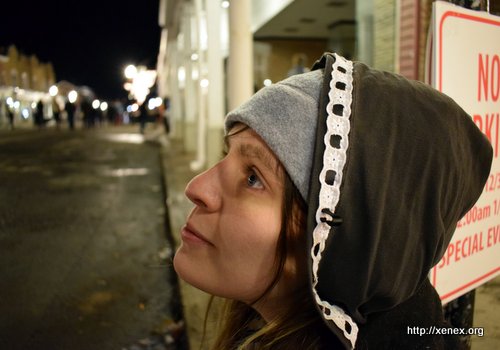
The ball drops to much shouting. Fireworks explode. I kiss Amber. She asks if we are going to our traditional brunch. I look at this crowd of strangers. With only the two of us (and a belly stuffed with catfish), I'd rather go home and start the new year fresh for the challenge.
Soon in Xenology: Faces. Daniel leaving. New friends.
last watched: Delicatessen
reading: Sleight of Hand
listening: Die Antwoord
In Four Short Weeks ««« 2017 »»» Last Sushi
Thomm Quackenbush is an author and teacher in the Hudson Valley. He has published four novels in his Night's Dream series (We Shadows, Danse Macabre, Artificial Gods, and Flies to Wanton Boys). He has sold jewelry in Victorian England, confused children as a mad scientist, filed away more books than anyone has ever read, and tried to inspire the learning disabled and gifted. He is capable of crossing one eye, raising one eyebrow, and once accidentally groped a ghost. When not writing, he can be found biking, hiking the Adirondacks, grazing on snacks at art openings, and keeping a straight face when listening to people tell him they are in touch with 164 species of interstellar beings. He likes when you comment.